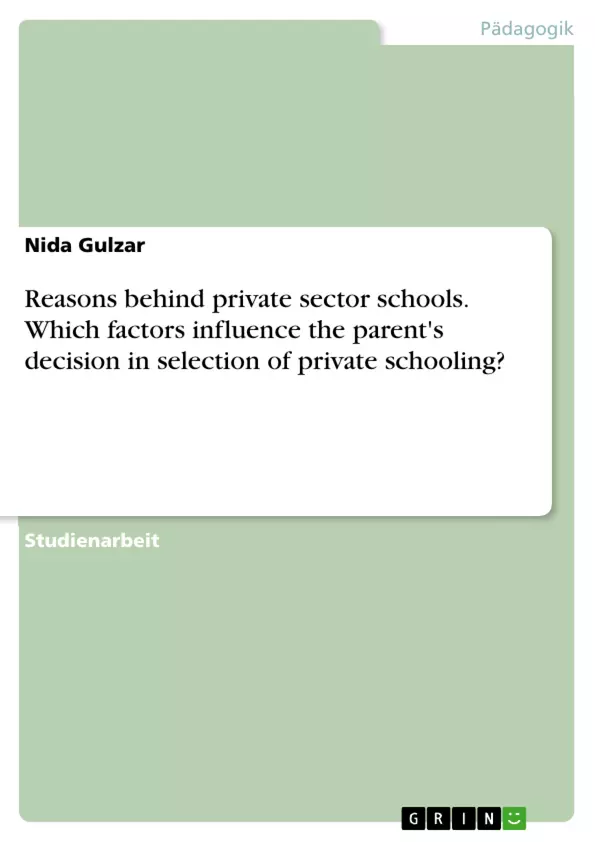The present study aimed to explore the reasons which convince parents to send their children in public sector schools instead of private sector schools. Moreover, the study also tried to understand the reasons for which parents send their children in private schools.
This research study aims to analyse the factors which influence the parent’s decision in selection of private schooling.
Research objectives: To identify the factors that encourage the parents to choose private schools for their children; To explore the reasons which convince parents to avoid public school while choosing school for their children; To compare parents perspective concerning school choice.
Inhaltsverzeichnis
- Kapitel 1: Einführung
- 1.1 Problemstellung
- 1.2 Forschungsziel
- 1.3 Forschungsziele
- 1.4 Hauptforschungsfrage
- 1.5 Spezielle Fragen
- 1.6 Bedeutung der Forschungsarbeit
Zielsetzung und Themenschwerpunkte
Diese Forschungsarbeit zielt darauf ab, die Faktoren zu analysieren, welche die Entscheidung von Eltern bei der Wahl einer privaten Schule für ihre Kinder beeinflussen. Das Hauptinteresse liegt darin, die Gründe zu verstehen, die Eltern dazu bewegen, private statt öffentlicher Schulen zu bevorzugen. Die Studie untersucht die Motivation der Eltern und die damit verbundenen Faktoren.
- Faktoren, die Eltern zur Wahl privater Schulen bewegen
- Vergleich der Perspektiven von Eltern bezüglich der Schulwahl
- Gründe für die Vermeidung öffentlicher Schulen durch Eltern
- Der Einfluss sozioökonomischer Faktoren auf die Schulwahl
- Die Rolle der wahrgenommenen Bildungsqualität bei der Entscheidungsfindung
Zusammenfassung der Kapitel
Kapitel 1: Einführung: Dieses Kapitel führt in das Thema der Schulwahlentscheidungen von Eltern in Pakistan ein. Es betont die Bedeutung von Bildung für die sozioökonomische Entwicklung und beleuchtet den wachsenden Einfluss des privaten Sektors im pakistanischen Bildungssystem. Es werden verschiedene Perspektiven auf die Rolle von Bildung diskutiert, einschließlich des utilitaristischen Aspekts, der sowohl staatliche als auch private Investitionen in Bildung antreibt. Das Kapitel definiert die Problemstellung, das Forschungsziel und die spezifischen Forschungsfragen, die sich mit den Motiven der Eltern bei der Wahl privater Schulen befassen. Besondere Aufmerksamkeit wird der Bedeutung der Studie für das Verständnis der Elternmotivation und die Verbesserung der öffentlichen Schulen gewidmet.
Schlüsselwörter
Private Schulen, öffentliche Schulen, Schulwahl, Elternentscheidung, sozioökonomische Faktoren, Bildungsqualität, Elternzufriedenheit, Pakistan, Investitionen in Bildung.
Häufig gestellte Fragen (FAQ) zu: Analyse der Faktoren, die die Wahl privater Schulen durch Eltern beeinflussen
Was ist der Gegenstand dieser Forschungsarbeit?
Diese Forschungsarbeit analysiert die Faktoren, die die Entscheidung von Eltern in Pakistan bei der Wahl einer privaten Schule für ihre Kinder beeinflussen. Der Fokus liegt auf dem Verständnis der Gründe, warum Eltern private statt öffentlicher Schulen bevorzugen.
Welche Ziele verfolgt die Studie?
Die Studie untersucht die Motivation der Eltern bei der Schulwahl und die damit verbundenen Faktoren. Sie vergleicht die Perspektiven von Eltern, beleuchtet die Gründe für die Vermeidung öffentlicher Schulen und untersucht den Einfluss sozioökonomischer Faktoren sowie der wahrgenommenen Bildungsqualität auf die Entscheidungsfindung.
Welche Themen werden im Einzelnen behandelt?
Die Arbeit behandelt Faktoren, die Eltern zur Wahl privater Schulen bewegen, vergleicht die Perspektiven von Eltern bezüglich der Schulwahl, untersucht die Gründe für die Vermeidung öffentlicher Schulen, analysiert den Einfluss sozioökonomischer Faktoren und die Rolle der wahrgenommenen Bildungsqualität bei der Entscheidungsfindung.
Wie ist die Arbeit strukturiert?
Die Arbeit beinhaltet eine Einleitung (Kapitel 1), welche die Problemstellung, das Forschungsziel, die Forschungsfragen und die Bedeutung der Studie definiert. Weitere Kapitel (nicht im Detail in diesem Preview beschrieben) werden sich mit den einzelnen Aspekten der Schulwahlentscheidung auseinandersetzen.
Welche Schlüsselwörter beschreiben den Inhalt der Arbeit?
Schlüsselwörter sind: Private Schulen, öffentliche Schulen, Schulwahl, Elternentscheidung, sozioökonomische Faktoren, Bildungsqualität, Elternzufriedenheit, Pakistan, Investitionen in Bildung.
Was wird in Kapitel 1 (Einführung) behandelt?
Kapitel 1 führt in das Thema der Schulwahlentscheidungen von Eltern in Pakistan ein. Es betont die Bedeutung von Bildung für die sozioökonomische Entwicklung, beleuchtet den wachsenden Einfluss des privaten Sektors im pakistanischen Bildungssystem und diskutiert verschiedene Perspektiven auf die Rolle von Bildung. Es definiert die Problemstellung, das Forschungsziel und die spezifischen Forschungsfragen.
Für wen ist diese Forschungsarbeit relevant?
Diese Forschungsarbeit ist relevant für alle, die sich mit dem Bildungssystem in Pakistan, den Entscheidungen von Eltern bei der Schulwahl und den sozioökonomischen Aspekten von Bildung auseinandersetzen. Sie kann für Bildungspolitiker, Schulverwalter, Forscher und alle Interessierten an diesem Thema von Bedeutung sein.
- Citation du texte
- Nida Gulzar (Auteur), 2018, Reasons behind private sector schools. Which factors influence the parent's decision in selection of private schooling?, Munich, GRIN Verlag, https://www.grin.com/document/432070



